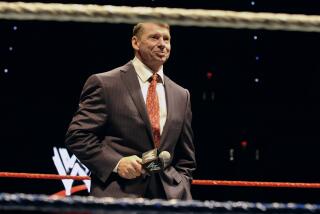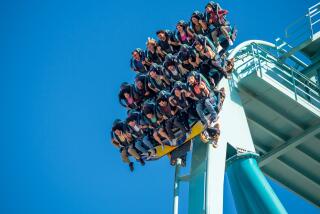Playing Roulette With the Future of Caesars World
- Share via
Hey, Las Vegas high rollers: Forget Caesars Palace. A better gamble might be the owner’s stock.
Shares of Caesars World have jumped sharply in recent days on a slew of takeover rumors. The stock has risen to $13.625 Tuesday from $10.875 a week ago, a 25% gain. The shares leaped $1.875 Monday and traded as high as $14.75 Tuesday before falling back. Trading has been heavy.
The Los Angeles-based company has nothing to say other than “no comment.” And that is making traders and Caesars investors even more suspicious. “The stock is incredibly cheap,” contends John Rogers, president of Chicago-based Ariel Capital, which owns just under 5% of Caesars. “It’s illogical how cheap it is.”
Who might want Caesars? The rumor mill is spinning out a long list of names, including the Pritzker family (Hyatt Hotels), wealthy Japanese investor Minoru Isutani and, according to a Las Vegas Sun report, a 32-year-old Indonesian high roller named Sukarmin Sukamto. Another rumor has Caesars CEO Henry Gluck and President Terrence Lanni leading a management leveraged buyout--or one of them leading a buyout, over the other’s objection.
Rumors aside, the hard numbers suggest that there is real value in Caesars at the stock’s current depressed price, even with a recession bearing down and real estate values crumbling. More important, the numbers suggest that a deal is doable--despite the national credit crunch imposed by terrified bankers.
David Jackson, analyst at the Western Group in Beverly Hills, figures it this way:
* At $13.625, the stock is trading for just 3.8 times the firm’s $3.58-a-share after-tax cash flow in the fiscal year ended last July 31. Among other things, cash flow tells you what’s available to pay the interest bill in a debt-financed buyout. Caesars has lots of cash coming in, and the after-tax figure should rise further, to $4.41 a share, this year.
* Given the firm’s cash generation, a buyer could easily afford to pay $30 a share for Caesars, Jackson says. Most other analysts’ estimates are in the ballpark of $25 to $30 a share fair value--a minimum 83% premium to the current stock price.
For that money, a buyer gets Caesars Palace in Las Vegas, Caesars Tahoe, Caesars Atlantic City and four resorts in Pennsylvania’s Poconos.
How solid an empire is that? Over the past year, Caesars has been hurt by major new competition in Vegas (the Mirage); a continuing slump in Atlantic City, N.J., caused by the depressed Northeast economy, and heavy capital expenditures to expand Caesars Palace. Earnings have fallen, but Caesars still is making a good buck: On revenue of $870 million in the recent fiscal year, it earned $1.52 a share, down from $2.72 the previous year.
Most analysts believe that Caesars’ earnings will turn this year, as capital outlays end and as a glitzy shopping mall opens adjacent to Caesars Palace early in 1991. Jackson sees $2 a share this year.
Of course, over the long term, anyone buying Caesars--the whole thing, or just a few shares--has to believe that the casino business is going to thrive. Maybe that’s still a big question. Nonetheless, the market has been playing some ridiculous valuation games with Caesars.
In August, Caesars decided to buy all of its Caesars New Jersey subsidiary. The parent already had 86% of Caesars New Jersey stock. The 14% holders were offered $22 a share.
At $22 a share, with 16.3 million Caesars New Jersey shares outstanding, that firm was valued at $358 million. Meanwhile, at $13.625 a share and 23.8 million shares outstanding, parent Caesars World currently is valued at $324 million.
How could the parent be worth less than the value of just one of its parts? Maybe that’s the question some of those rumored bidders--and CEO Gluck--have asked themselves about Caesars.
If a deal can be financed, any buyer with a long-term view might be getting Caesars for a song. And if a bidder comes along, Gluck and Lanni may not have much choice: Insiders own less than 3% of Caesars’ stock, so it’s wide open to any buyer who can qualify for a casino license.
A hostile takeover in 1990? Investor Martin Sosnoff went after Caesars in 1987 with a $32-a-share offer. He was rebuffed. Today, Caesars is a bigger company, yet a buyer may not have to pay any more than what Sosnoff offered three years ago.
Who knows--but Caesars’ future may now be a roll of the dice.
More to Read
Sign up for The Wild
We’ll help you find the best places to hike, bike and run, as well as the perfect silent spots for meditation and yoga.
You may occasionally receive promotional content from the Los Angeles Times.






